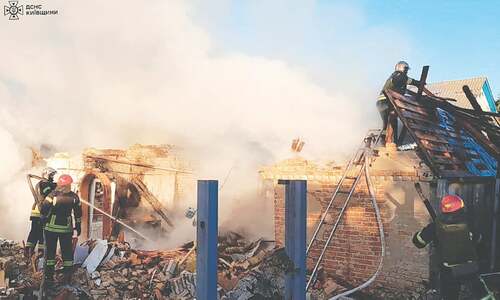LAGOS: The Nigerian government has lost control of security, according to its own advisers, and lacks a coherent strategy to counter the threat of terrorism.
Senior political and military figures have told the Guardian of their growing pessimism over the government’s ability to contain Boko Haram, the Islamist sect responsible for a deadly wave of bombings and kidnappings in northern Nigeria, and are bracing themselves for an escalation in attacks.
“We have a serious problem in Nigeria and there is no sense that the government has a real grip,” a senior official close to the government said on condition of anonymity. “The situation is not remotely under control. It is just a matter of time before we see more large-scale attacks that pose a significant threat to national security, and now Nigeria’s economic growth is also at risk.”
Boko Haram — whose name is often translated as “western education is sinful” — has become increasingly sophisticated in its operations since first launching mass attacks in northern Nigeria in 2010.
The sect first began using violence against the Nigerian government and police in 2003, and is believed to have advanced its operations in recent months by attracting funding and support from Al Qaeda in the Islamic Maghreb and al-Shabaab.
In 2009 Boko Haram launched a new phase of operations following the killing of its leader, Muhammad Yusuf, by police and security forces.
Since then, a spate of deadly church bombings has left hundreds dead, while attacks on mobile phone base stations have paralysed telecommunications in northern Nigeria, causing an estimated $5m worth of damage.
The government has attempted to fight back against the sect, and claims to have killed at least 35 suspected militants earlier this week, and detained 60 others during raids in Adamawa and Yobe states in northern Nigeria — two of the areas most affected by the violence.
But its failure to stop Boko Haram attacks has led many to question the leadership of President Goodluck Jonathan, who promised in March that security services would have ended the insurgency by June.
A senior defence official, who asked not to be named, expressed concern that the government had failed to demonstrate the necessary political leadership to combat the threat posed by Boko Haram.
“Leadership is the problem,” said the source. “When we had military dictatorships in Nigeria, we did not experience this kind of weak decision-making. There is no way we can combat this threat without more decisive action. You cannot divorce what is happening from weak leadership and the failure to repair the divisions in our society.”
“The level of poverty in the north, and the way southerners are behaving with impunity — it is not surprising that there is this level of discontent in northern Nigeria.”
Experts have frequently attributed the rise of Boko Haram to the growing divide between rich and poor in Nigeria, compounded by regionalism that has often pitched the largely Christian south against the predominantly Muslim north.
Of the two-thirds of Nigerians — 100 million people — living below the poverty line, Nigeria’s national bureau of statistics said that the number living on less than one dollar a day was higher in the north, with rates of around 70 per cent, compared with rates closer to 50 per cent in the south. Much of the north has illiteracy rates of above 75 per cent.
“These acts are a reaction against decades of neglect,” the source close to the government said. “They are similar factors to what we saw driving revolution in the Arab spring.
“The Boko Haram phenomenon underlines the failure of the Nigerian state,” said Manir Dan Ali, editor of the Daily Trust newspaper. “The government has ignored the advice of its own security officials, who warned of the danger signals long ago, and worse, lacks a coherent strategy for dealing with the problem and its underlining causes of poverty, neglect and a lack of opportunities for the young.”
Resentment towards the Nigerian authorities has been compounded by human rights abuses, including extra-judicial killings, experts say.
By arrangement with the Guardian












































Dear visitor, the comments section is undergoing an overhaul and will return soon.